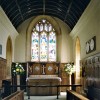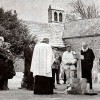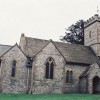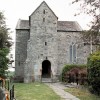Outside St. Peter’s Church in Dorchester there stands a statue to a bearded, venerable looking old man in a frock coat. The monument is to keep alive in the minds of Dorset men and women the memory of a phenomenal fellow Dorsetman born just over 200 years ago. He was William Barnes, a figure who’s achievements would be remarkable by today’s standards, but are made even more so by the fact that he was a farmers boy who came from a humble and wholly rural background. And he became a most learned individual in an age when a large proportion of the population was illiterate.
Barnes was born in a cottage in Bagber, a community in the Blackmore Vale country near Lydlinch in 1801. After an elementary schooling that ended when he was 13, Barnes acquired a position as a solicitor’s clerk. Scholarly by nature, he read widely during these years, gaining some informal tuition from friendly clergymen with the aim of training to become a teacher. This career he embarked upon in 1823 when he went to teach at a small school near the church at Mere in Wiltshire.
In 1831, after becoming Head of the Mere Chantry School, he wrote a series of articles for a publication called Hones Year Book, which included one about a certain custom called Lent-Crocking. This originated as a Roman Catholic tradition where people would go around in an evening throwing crockery shards at front doors.
Following his marriage to a woman called Julie Miles and the births of some of his six children, William moved his family back to Dorset and settled in Dorchester to run a school in the town. During these years his devoted wife slipped easily into the role of acting as his business manager so that Barnes could study for a ten-year Bachelor of Divinity degree. In 1848 he was ordained minister of the Church of England, going on to become a mature graduate of St.John’s college, Cambridge in 1850.
During the years Barnes’ Dorchester school was open it became noted for the unusually high number of pupils for its size who became great men of renown. Not least among these was the famous surgeon and writer Sir Frederick Treves, who fondly recalled the austere figure in black sitting like some grim inquisitor in the high chair, who gave him as his first lesson in dictation the sentence “logic is the right use of exact reasoning.”
Sadly, Julia died from breast cancer in 1852, after which time the school declined, eventually closing in 1862 when Barnes was appointed Rector of Winterbourne Came ( or simply Came) that year. He would remain in this ecumenical position until his death 24 years later.
Like Thomas Hardy, William Barnes was bodily feeble and sickly as a child. But as so often is found in those of a feeble constitution, they possess an intellectual prowness that more than makes up for physical inadequacy. Barnes was a polymath in the most extreme sense of the word. He mastered 65 languages including Latin, Greek, Hebrew, Welsh, and oriental languages. He wrote ‘A Philological Grammar,’ which compared over 60 languages, and early on became a poet, publishing three anthologies of verse in the Dorset dialect between 1844 and 1866. In these works Barnes always felt closer to the purer Anglo-Saxon English than to its later forms. Indeed, he spent most of his life campaigning against classical and foreign influences he felt were contaminating the language.
But the Rector of Came was just as interested in modern English, and his verses in this form are often rich in nostalgic rural idyll. Examples of these are ‘Mothers Dreams; The Storm Wind; Musings; Evening and Maidens, and The Wife A-lost.’
Barnes was also a prolific feature article journalist, musician, artist, and lecturer. For instance, he wrote articles for many years for ‘The Gentlemen’s Magazine’ about Dorset history, customs, and the origins of the English language. He wrote pamphlets and articles on the social conditions of the poor, and a philosophy of education was also published. Barnes wrote industrially on technical, scientific and artistic subjects. He toured Wessex, taking pleasure in delivering talks and readings on all manner of subjects well into his 80’s.
The coming of the railways found in Barnes another new interest. The track-laying naturally created cuttings where bedrock was often exposed in the sides. These deep cuttings fired his imagination and fostered a new interest in geology. But like many other natives of a county particularly rich in the vestiges of prehistoric habitation, the Rector was also knowledgeable about archaeology. Doubtless the enormous scope of his interests largely accounted for his popularity.
For the long 34 years of his widower-hood William was a fascinating and stimulating father to his children, who were a great credit to him. During these years the pace of life slowed at the Rectory, where the children of the writer Llewellyn Powys often went for tea. In his youth Thomas Hardy too, was a constant friend and visitor. It was Powys however, who was just one of the people to sum up Barnes’ genius when he wrote: “no-one, not even Hardy, can conjure up more surely the picture of a sweltering hayfield at the time of the Feast of St.Barnabas.”
Barnes once told Edmund Gosse that no critic would have daunted him. He regarded writing as a “refreshment of mind as is music to a man who may play an instrument alone” (Barnes learned to play four instruments.) But George Saintbury, a Hampshire acquaintance, was too wary of offending Barnes’ many admirers to be overly critical of the Rector’s poetry; he simply described it as “domestic, gentle and pastoral.” E.M. Forster said of William Barnes that “to read him is to enter a friendly cottage where a family party was in full swing.” To the Dorset publisher Newman Flower he was a quaint clerk in holy orders, going around Dorchester in black stockings, Quaker garb and a broad-brimmed hat.
What these writers saw in Barnes was a bard of exceptional standing who contrived successfully to portray the joy of simple country life. Yet Barnes’ life was a struggle in some ways. Early in his teaching career he experienced major disappointment when being passed over for the position of Headmaster at Dorchester Grammar School. He was not the kind of un-ambitious character of “woodlands flow’ry gleaded” suggested in one of his hundreds of verses. Rather, he was an over-earnest man following serious past-times and improving with every shining hour. In no small measure it was these traits which bought him his fame as England’s greatest dialect poet and his phenomenal linguistic skill.
His legacy is a portrait of the agrarian life and dialect of Dorset, an idiom of speech which almost died out by his day. The directness and simplicity of his writing hide learnedness and an ear for the music of dialect speech which has never been surpassed. His poem ‘Linden Lea’ was set to music by the Gloucestershire composer Ralph Vaughn Williams.
One achievement of his last years was to become a founder of the Dorset Field Club. This became the steering body for the future establishment of the Dorset County Museum. It is appropriate therefore that Barnes should now stand in effigy outside St.Peter’s, and barely 50 yards from the institution he was partly responsible for bringing to birth. He also served as joint secretary of the Museum for some years.
In 1886 a visitor to Barnes at the Rectory found him on his deathbed. Clad in a red robe like a Cardinal, he died no less picturesquely than he had lived, a spectacle which made his visitor liking him to a dying pope. He lies beneath a memorial cross in the churchyard of St.Peter’s at Winterbourne Came. A second edition of his ‘Glossary of the Dorset Dialect’ was re-printed that year which included the word ‘tutty’ to mean a posy.
It was October when he died, but devout schoolchildren could still find enough flowers to throw into his open grave.



